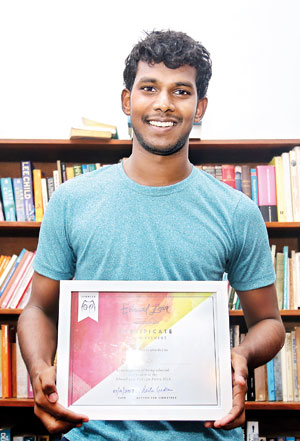Arts
Writing poetry bit harder than Uni assignments
View(s):
Taken by surprise: Ashwin with his award. Pic by Anuradha Bandara
‘There was a fine fellow from Kandy
Who’d knock down his fair share of brandy
This habit didn’t last, ended up in a cast
The night they ran out of shandy’
So wrote 25-year-old Ashwin Dias a few days before the deadline for the Edward Lear Prize for Poetry awarded on January 13, 2017. A civil engineer from Dehiwala who works at an engineering firm in Colombo, Ashwin writes as a hobby, but rarely poetry. However, he decided to try his luck at the competition. “My friend sent me the link because he thought I was a funny guy and I might like to enter,” he says.
Although quite sure he would not win, he decided to take up his friend’s suggestion. As luck would have it, Ashwin found himself the first winner of the Edward Lear Prize for Poetry and today he seems quite amused at the idea of walking away with this unusual prize.
The Edward Lear Prize for Poetry was introduced to encourage up and coming poets between the ages of 18 and 30 to showcase their talents. Conducted in association with the Fairway Galle Literary Festival, it was awarded by the Owl and Pussycat Hotel in Thalpe and carried a cash award of Rs. 250,000. The competition required that entries keep to the overall theme of Edward Lear’s nonsensical poems, and bring about a feeling of lightness and optimism. A panel of five local and foreign judges evaluated the entries based on relevance to theme, their own impression of the poem, the poetic structure, originality and spelling before determining the final winner.
A past student of S. Thomas’ College, Mount Lavinia and the University of Moratuwa, Ashwin is interested in Civil Engineering and competitive sports such as distance running and football. Whenever time permits, he reads fiction and nonfiction and considers thrillers/ new age books by authors such as James Patterson and Paul Cohelo quite intriguing. He appreciates good poetry, something which he feels should tug at people’s heartstrings. “It should convey feeling to the reader,” he says.
Having only written funny articles and prose before, poetry was harder to write, he says. It was only when he started reading some of Edward Lear’s work that inspiration struck. Noticing that the poems stuck to places in England and the West gave him an idea. “I thought it would be interesting if we could do something with Sri Lanka instead,” he said.
This was how ‘The funny people of Sri Lanka’ came about. Although his mistaken impression that the entry had to be in limerick form would have made the task much harder for most, this was probably advantageous for Ashwin as he found the structure much easier to work with. Harder than the engineering assignments he had in university though, he laughs, recalling, “I used to do assignments which we were given two weeks for in university in the last two nights and tried to do the same thing with this.” “I think you need more time to be creative, “ he says adding that in retrospect, he feels that he could have improved on his entry.
Ashwin was away on holiday in Thailand, when his mother called to tell him he had won the prize. “I could not believe it, I thought she was pulling my leg,” he says adding that his friends still find the idea of him writing poetry hard to comprehend.
Ashwin feels that the prize is a good initiative for budding poets, especially given the fact that the arts are under appreciated in Sri Lanka. “There are not too many opportunities out there for poets,” he noted, adding that this was indeed a great way of allowing people to showcase their talent. He hopes that more people will take up the challenge of writing.
What advice does Ashwin have for anyone interested in entering the competition this year? “Spend more time than I did coming up with your poem,” he says, adding that anyone who has the slightest inclination towards poetry should apply. “You never know what will happen unless you’re willing to take a chance.” As for Ashwin, he sees himself possibly writing more in the future, although most of it will probably not be poetry.

